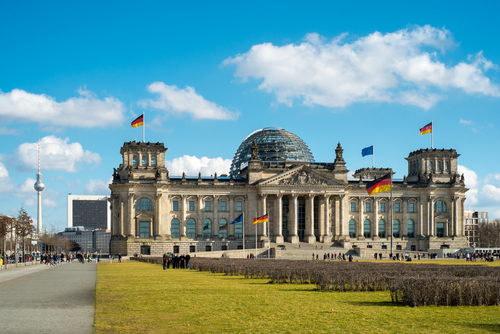The Need for a Stronger Germany and the Undertone of a Pope’s Gift

Please note that we are not authorised to provide any investment advice. The content on this page is for information purposes only.
German Chancellor Merkel visited the Vatican over the weekend. Consistent with the diplomatic practice, they exchanged gifts. The Chancellor gave to the Pope a Bach CD and a donation for refugee children. Pope Francis gave Merkel a medal with a picture of St.Martin giving his coat to the poor.
German Chancellor Merkel visited the Vatican over the weekend. Consistent with the diplomatic practice, they exchanged gifts. The Chancellor gave to the Pope a Bach CD and a donation for refugee children. Pope Francis gave Merkel a medal with a picture of St.Martin giving his coat to the poor.
The perfunctory exchange of gifts among diplomats often has an underlying subtext. One such example was when UK Prime Minister gave French President Mitterrand a copy of the Dicken’s Tale of Two Cities, which is somewhat critical of the French Revolution. In response to the perceived slight, Mitterrand surrounded Thatcher by representatives from francophone Africa on an outing to the Opera.
The benign interpretation of the Pope’s gift to Merkel is a gentle reminder that world leaders have a responsibility to help the world’s poor. A more pointed interpretation is about the generosity of the spirit in Europe as well.
A few years ago, the Polish foreign minister acknowledged that he might be the first Polish foreign minister in history to say this, but he was more fearful of German inaction than German action. This captured a shared sense of the greater need for enlightened German leadership.
Germany acts to defend its national interest. It acts like the first among equals. It has been a clear defender of the rights and prerogatives of creditors. Germany needs to act more like a hegemon. At times, this requires the sacrifice of short-term interest for the sake of systemic and strategic needs.
In term of a historical parallel, perhaps Germany is acting as the US did after WWI. It proposed a League of Nations (one of Wilson’s Fourteen Points), but ultimately the US Congress was not prepared to see its sovereignty eroded. It was not so much isolationism, as many portray, but rather the desire to preserve the freedom of unilateral action drove decision. The US did not have the institutional capacity to be the world’s leader.
The Pope’s gift to Merkel may a broader reminder of the obligations of leaders. The particular economic problem in the Eurozone is that the savers in the creditor countries are no longer recycling their surplus to the debtors. Various measures by the ECB aim at reanimating this process, including the purchase of sovereign bonds that starts next month. However, fresh stimulus from the core does not blunt the fiscal consolidation in the periphery.
To the contrary, Germany reported a record trade surplus in 2014 of nearly 220 bln euros or almost 6% of GDP. German exports rose 7.2% in 2014, while imports rose 2.4%. In a world that suffers from the lack of aggregate demand, Germany was part of the problem, not the solution.
Without fiscal union or a political union, the need for stronger German leadership is all the more urgent. Ironically, German Chancellor Merkel is widely regarded as among the most skillful leaders of our generation. She is a tactician par excellence, yet she seems to lack her mentor Chancellor Kohl’s vision, and we are all poorer because of it.
The Pope’s Revealing Gift to Merkel and the Future of Europe is republished with permission from Marc to Market




